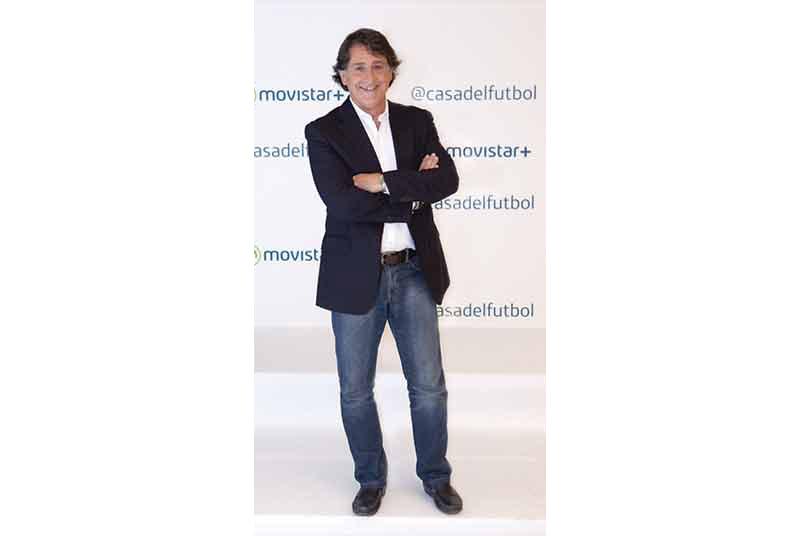“Nobody should believe himself better than the others, nor worse”
Football changed the life of Raúl Ruiz (Logroño, 1966), but not his essence. He was a small time footballer turned star journalist, but remained the same: his work over more than 20 years proves it, always covering modest football, unearthing individual stories, highlighting achievement and that kind of success that will never make it to the headlines, underlining the experience of sport as a tool for personal education. In doing so he developed a pioneering personal style, one that really mirrors the human being he is. Raúl will be appearing at the multiconference event set by De los Pies a la Cabeza.
- It was a trip which changed your whole life…
- Yes, everybody knows the story. I was playing for Numancia and we faced Barcelona in the Copa del Rey quarter-final. Home game was a draw and then before we travelled for the away match at the Camp Nou, Canal+ put an amateur camera in my hand and asked me to film everything that happened during those days. I was and audacious outgoing person and they liked what I did, so after the channel aired the report, they proposed me to join Canal+ and become a reporter for them, doing that very same kind of stuff on a regular basis. So after many hard years in football, going through a lot, I became a TV reporter, had to research my own stories, do the editing… everything. It was truly incredible, but I never looked back upon it. Never thought about it. And the rest is history…
- Let’s do a round trip through your different lives: from draughtsman in a working-class neighbourhood to small time footballer, then sports correspondent and, finally, reporter telling stories about small time football… Ever tried to make anything out of such a journey?
- Not even once… Everything happened in an absolutely natural way. I never imagined anything like it, not even when I was doing the film for that Canal+ show. I was a draughtsman, true, but never worked as one, I must have drawed four or five plans maximum. I very soon took football and had very hard times as a player. That must have given me the ability to tell stories in the way I do: looking for achievement, exposing unjustice or highlighting solidarity. What I long to tell is real football, the one everybody plays. And I am happy for it, I take a great satisfaction out of telling human stories.
- You ever heard of the concept comfort zone?
- No clue. Luckily I enjoy what I do, and that makes it comfortable for me. But at the same time I’m the kind of person who really likes doing things properly, so I don’t indulge… I’m really very happy with what I do.
- “We are afraid of dying, but in true what we fear the most is living”, as Javier Hernández says. The courage to take choices and challenge goals. You did and it changed your life.
- It is true but I never took it as a challenge in the first place. I just took the chance. Maybe that’s how I am, I always try to enjoy everything I do to the fullest, whether it may be a kick-around or a meal with friends: I take it as if it was the last one. And who knows… it might be.
- Your work tells about football… but what you really focus on are the persons behind it, their stories, their lives. What do you learn from them?
- A great deal. My work has given me the opportunity to meet people and learn from them. Take Javier Hernández, for example: when we first met, I saw his vitality, his eagerness to help and do things for others, and that made me think. He made me think.
- And what did you get out of that reflection?
- First and more important, this: I believe we make things more difficult than they actually are. At the end of the day, life’s very simple. To me it is about tolerance, which I hold as a core value. Nobody should believe himself better than the others, nor worse. Because we are not. Sometimes people tell me that what I’m doing is more respectable that, I don’t know, El Chiringuito. But I say… hey, respect what the others do; it is their choice and it is legitimate. I feel I am being honest with what I do, but every single person must be happy with what he does and with his conscience.
- Kapuscynski said: “Journalism is not for cynics”. But the profession is full with them. You are the opposite.
- When people get to know me they go like: “Hey, you are the same as you appear in TV!”. It oftens happens that the image you get of someone on the telly has nothing to do with his real self: he may seem nice but he is an arsehole. I can’t do that, I am what you see. I never intended to work on TV. It’s been 21 years now and everything I did was natural. If you are not what you look like, then you will not be credible. You need to keep this in mind: it is the viewers who allow you to be on TV. End of the story. So you must show respect for them.
- What’s behind your journalistic approach to football?
- I try to give back. I went through difficulties while playing football, because that is what happens in Segunda B, when you don’t know whether you are semi-professional or just an amateur. I was not getting paid, I couldn’t even pay the rent. That’s why I identify myself with those players and teams who appear in Caos FC. If I can help them, I do it. When I first arrived in television, my boss said to me: “Listen we are a TV channel, not a NGO, we have to inform and entertain”. And I replied: if we can do that and on top of it we are able to help people too, then TV becomes perfect. That’s what I try. I don’t get to a place and behave like I am the Messiah, but if I can help people, I will do it. I feel very much related to them.
- It is like if you are making a statement: not everything in life is competition, money and glamour. Reality is another thing.
- Luckily I’ve been given the opportunity to work in a show like Caos FC, in which Michael Robinson and myself go around finding local clubs, with their clay pitches, their human stories, people who play football just for the sake of it. There are no more than 40 fully professional teams in Spain, but all the others waste money and time to play football. They play just because they love the game, their local shirt, or maybe they are making sure that kids can play football themselves. The biggest compliment I ever got came from Michael Robinson when he said: “I have played in lovely grass pitches and for great clubs… but you have known real football, not me”. I really enjoy myself doing Caos FC, like a pig in the dirt.
- And you show what’s best in sport.
- I don’t despise pro football, there have to be the Messis and the Ronaldos. They are the reference to look up to. But you have to long to become a footballer not for the money, but for the passion. Look up at the stars for how they play, not the money they make. If you don’t know what’s good in everything, then you won’t be able to tell what’s bad.
- Sometimes we fear that our idols are just playing a role in a fiction set up for the fans.
- It surely is. The fans feel the rivalry between the clubs and think it is the same for players, but it is not: they are colleagues, even friends. The fan thinks they must hate each other, but it doesn’t go like that. When you become a pro footballer, you get some things and you lose others. The other day I met Julio Baptista, the brazilian ex Real Madrid and Sevilla player; and he told me that now he is 37 he loves playing football just to enjoy himself in the same way he used to do when he first started playing. It is the same for Michael Robinson: one day we visit La Puebla de Alfindén in Zaragoza and get to know its local club side, and the next day Michael is at the Barcelona-Real Madrid match. And he says: “Well, I enjoy it more at La Puebla”.

